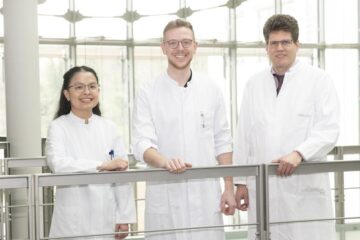Serious children’s infections also spreading in Switzerland

Sepsis can be caused for example by meningococcus. Electron-microscopic image: Department of Paediatrics, Inselspital, Bern University Hospital
The ten largest children’s hospitals in Switzerland researched the causes and effects of serious infections (so-called sepsis or commonly known as “blood poisoning”) in children together for more than four years. The national study shows for the first time which children fall ill, with which germs, how severe the infection is and what the effects are. The study appeared on 20 July 2017 in the specialist journal „The Lancet Child & Adolescent Health“.
Risk factors: Hospital germs, catheter, predisposition to immunodeficiency
Over 1,200 children fell ill in Switzerland during the assessment period. “On the one hand, sepsis in part affects previously healthy children with very severe cases. On the other hand, a third of all sepsis cases emerged through bacteria that the children had picked up during a hospital stay,” Dr. med. Philipp Agyeman, Senior Physician at the Department of Paediatrics at Inselspital, Bern University Hospital, summarises. This was particularly common for premature babies, children under chemotherapy and seriously ill children who were hospitalised in an intensive care ward. Seven percent of the children died, despite the best possible medical care.
Prevention as a decisive starting point
Experience in other countries shows that a portion of the Swiss sepsis cases could likely be avoided through better prevention. “This should be especially applied for premature or newborn babies or children with an underlying disease,” Prof. Dr. Christoph Berger says, co-Head of Infectious Diseases and Head of Hospital Hygiene at Zurich Children’s Hospital. Since frequent hospital visits or a venous catheter are a risk for a hospital infection.
Other clues were provided by a national database set up in the course of the study with blood tests for children’s sepsis. “Through a genetic analysis of the genome of the children concerned, we can identify immunodeficiencies which make children particularly susceptible to sepsis,” the head of studies Prof. Dr. med. Luregn Schlapbach from Inselspital, Bern University Hospital explains. In cooperation with the EPFL, the Swiss Federal Institute of Technology in Lausanne, other investigations on the genetic causes enabling sepsis in children are planned. The findings should improve the prevention and therapy of sepsis.
Sepsis is a severe bacterial infection which, left untreated, quickly leads to the failure of vital organs and to death. Several millions of children die from it each year worldwide. On average, one child in Switzerland contracts the life-threatening infection every day.
The world health organisation therefore passed a resolution in Geneva in May 2017 which commits the signing countries to better sepsis prevention.
For the Swiss Pediatric Sepsis Study (Directors of Studies: A/Prof. Dr. med. Luregn Schlapbach, Prof. Dr. med. Christoph Aebi, Dr. med. Philipp Agyeman, Prof. Dr. med. Christoph Berger), the University Children’s Clinics Bern and Zurich have researched Swiss sepsis cases in children since 2011 in collaboration with the Pediatric Infectious Disease Group of Switzerland (PIGS) and the Children’s Clinics in Aarau, Basel, Chur, Geneva, Lausanne, Lucerne and St. Gallen as well as the University Hospital of Zurich. The study is a close collaboration with the two large EU research projects EUCLIDS and PERFORM, which have the world’s largest database for research on genetic factors of children’s sepsis.
The study was supported by the Swiss National Science Foundation, the Schweizerische Gesellschaft für Intensivmedizin (Swiss Society for Intensive Care), the Vinetum and Borer Foundation, the Wyeth Foundation for the Health of Children and Adolescents and the Bangerter Foundation.
Media enquiries:
Dr. med. Philipp Agyeman, Medical Specialist for Paediatric Infectious Diseases and Senior Physician, Department of Paediatrics, Inselspital, Bern University Hospital, philipp.agyeman@insel.ch.
Prof. Dr. med. Christoph Berger, co-Head of Infectious Diseases and Head of Hospital Hygiene, Zurich Children’s Hospital and Coordinator, Paediatric Infectious Disease Group of Switzerland, christoph.berger@kispi.uzh.ch.
A/Prof. Dr. med. Luregn Schlapbach, Lady Cilento Children`s Hospital Brisbane, Australia, l.schlapbach@uq.edu.au.
http://www.thelancet.com/journals/lanchi/article/PIIS2352-4642(17)30010-X/fullte…
Media Contact
More Information:
http://www.insel.chAll latest news from the category: Health and Medicine
This subject area encompasses research and studies in the field of human medicine.
Among the wide-ranging list of topics covered here are anesthesiology, anatomy, surgery, human genetics, hygiene and environmental medicine, internal medicine, neurology, pharmacology, physiology, urology and dental medicine.
Newest articles

Targeted use of enfortumab vedotin for the treatment of advanced urothelial carcinoma
New study identifies NECTIN4 amplification as a promising biomarker – Under the leadership of PD Dr. Niklas Klümper, Assistant Physician at the Department of Urology at the University Hospital Bonn…

A novel universal light-based technique
…to control valley polarization in bulk materials. An international team of researchers reports in Nature a new method that achieves valley polarization in centrosymmetric bulk materials in a non-material-specific way…

How evolution has optimised the magnetic sensor in birds
The magnetic sense of migratory birds is probably based on the protein cryptochrome 4, and a genetic study has now provided further support for this theory. A team of researchers…





















